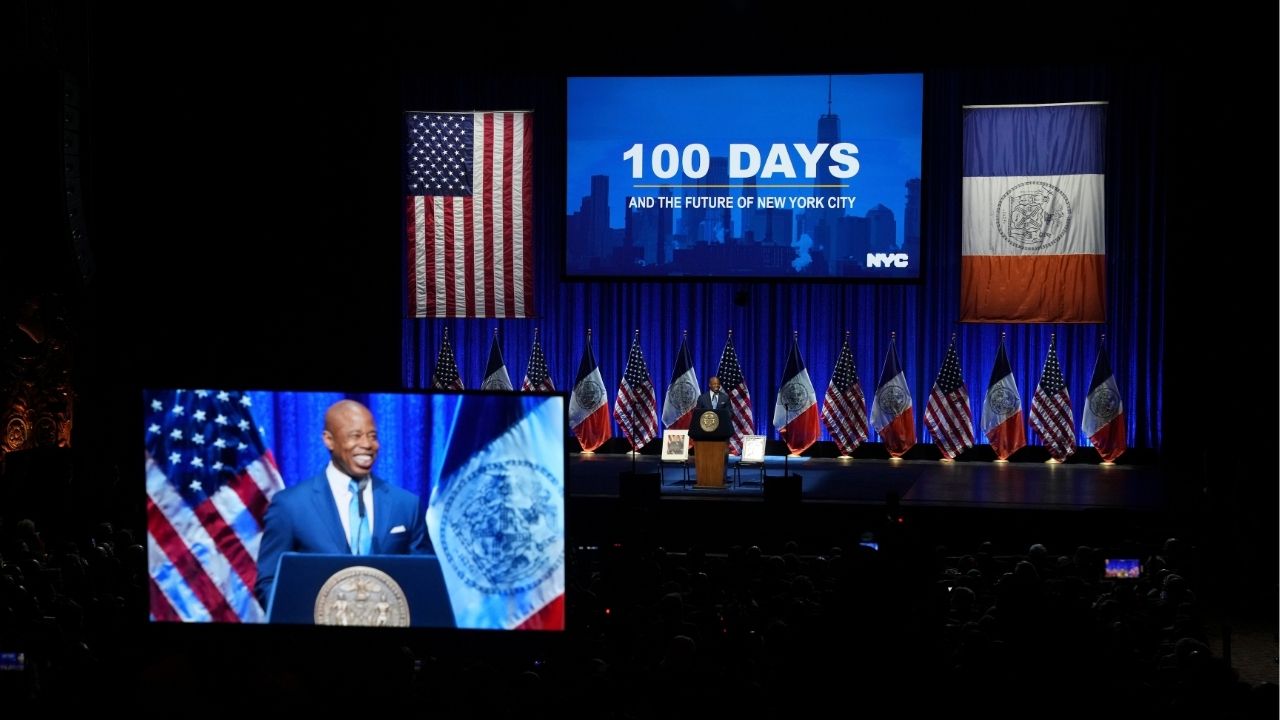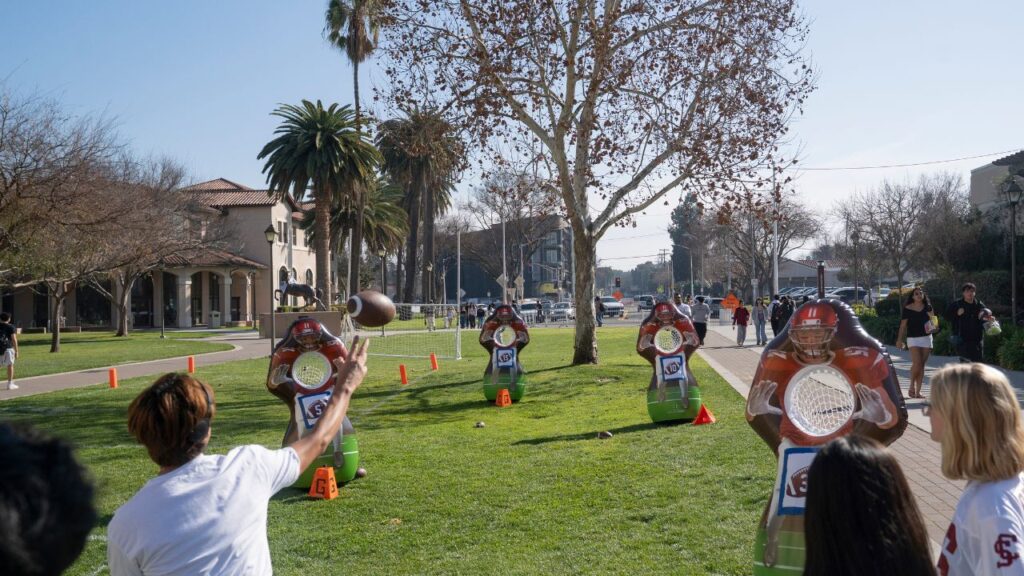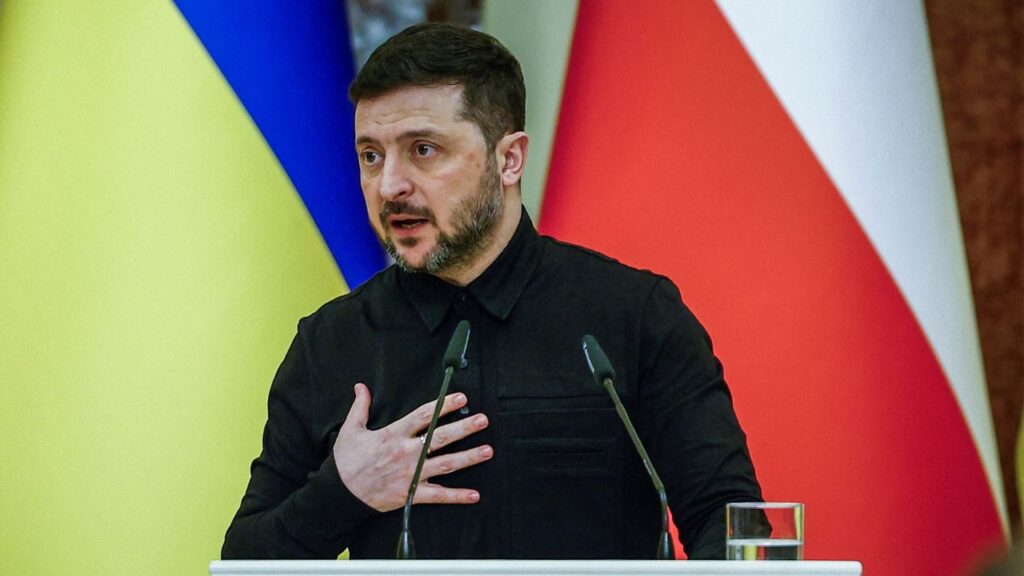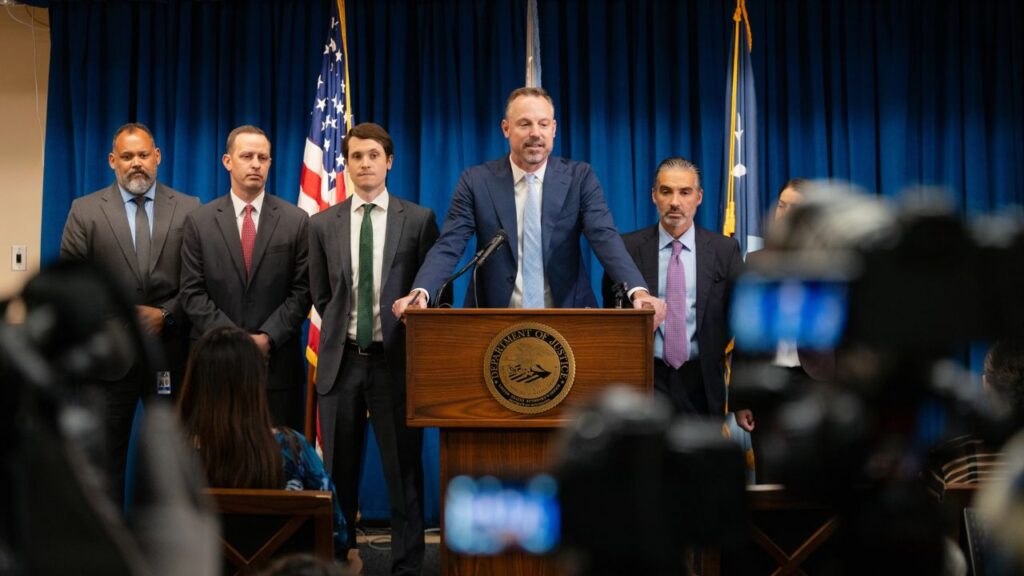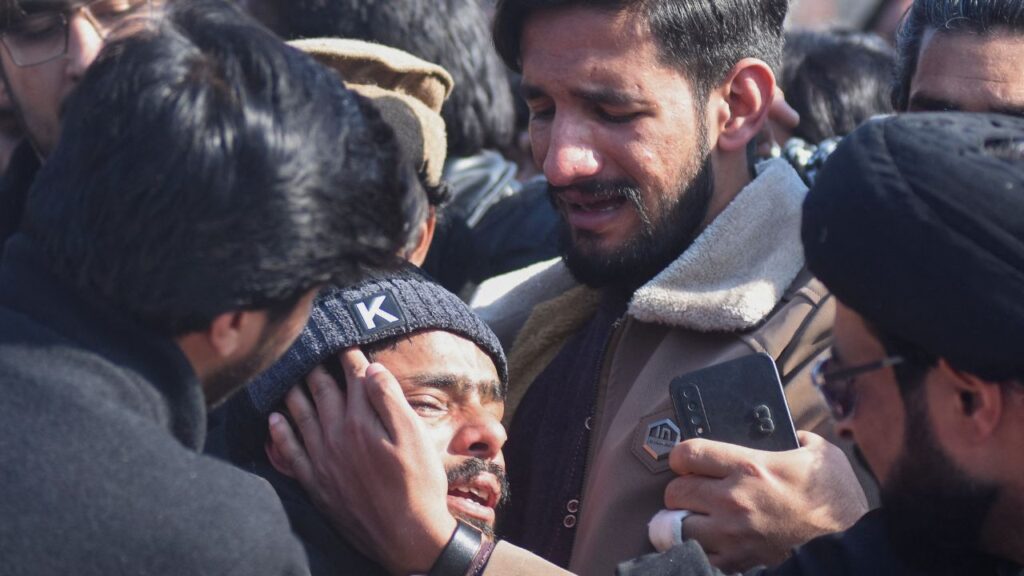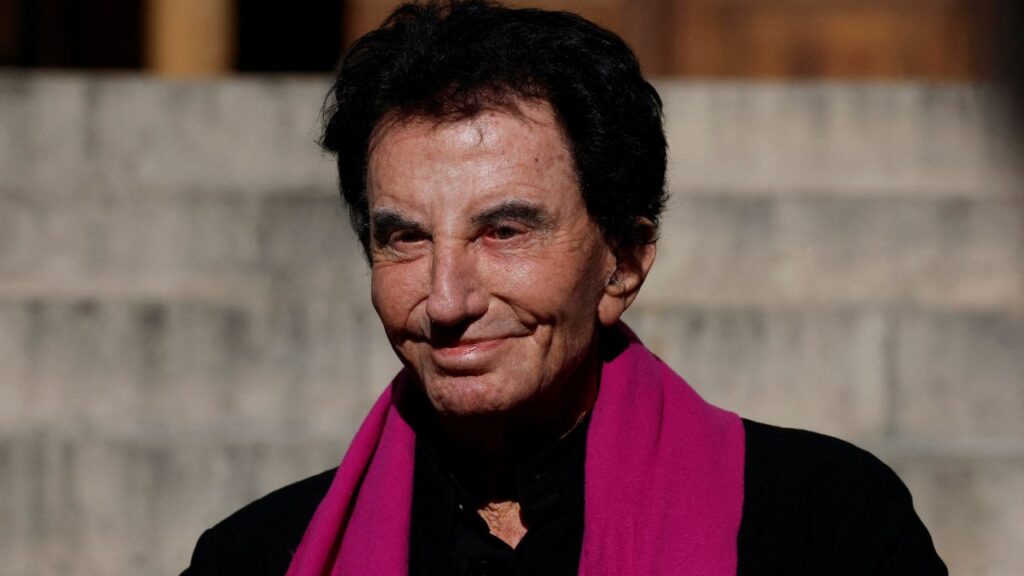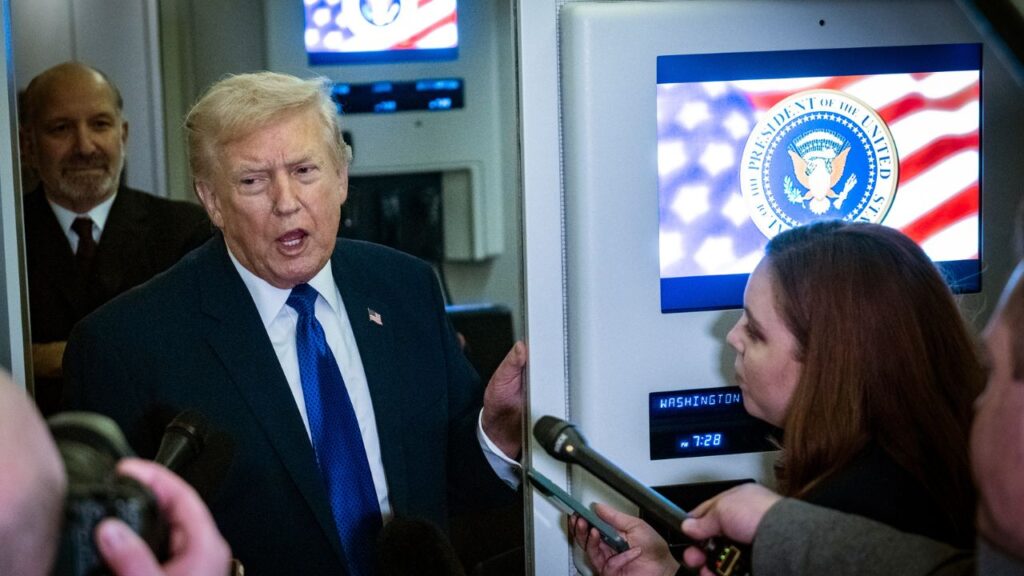New York Mayor Eric Adams speaks about his budget in Brooklyn, April 26, 2022. Adams has suspended his re-election campaign, becoming the first mayor of New York City to fail to win a second term since David Dinkins. (Todd Heisler/The New York Times)

- Once hailed as the “face of the new Democratic Party,” Eric Adams ends his reelection campaign amid corruption scandals.
- Federal prosecutors charged Adams with bribery and fraud, and his poll numbers collapsed after courting President Donald Trump.
- Despite lowering crime and reviving New York’s economy, Adams’ controversies, resignations, and indictments eclipsed his achievements and ended his career.
Share
|
Getting your Trinity Audio player ready...
|
NEW YORK — Four years ago, Eric Adams, fresh off what would become a razor-thin victory in the Democratic primary for mayor of New York City, held forth with characteristic bombast. He was the “face of the new Democratic Party,” he said.
He suggested that with his working-class roots and police background, he was the model of new leadership for a party held hostage by the gentrifying elite. He would orient City Hall toward the dispossessed and the underserved. And as the city’s second Black mayor, he would continue the legacy of the first, David Dinkins.
“I am you,” he told his supporters that November, after he won the general election. “The campaign was never, never, never about me.”
But as he began to lead New York City, Adams allowed his focus to become uncommonly inward-looking, oriented around the very few allies he considered sufficiently loyal.
Questions arose early on about his character, job performance and decision-making. He was caught lying about what he ate and with whom he owned real estate. And investigations plagued his administration, finally landing at the mayor’s door.
Adams Charged With Bribery, Fraud
Federal prosecutors charged Adams with bribery and fraud, saying he accepted free and heavily discounted travel on Turkish Airlines in exchange for help opening a new Turkish consulate in Manhattan that the Fire Department had deemed unsafe. Prosecutors accused him of knowingly soliciting illegal foreign donations that were routed through straw donors.
The high hopes that many New Yorkers had for Adams have long since been dashed, and on Sunday, the mayor’s own ambitions ground to a halt. Acknowledging the political reality that the city he runs does not want him to remain in City Hall, Adams said he would stop campaigning for reelection.
In his first State of the City address, Adams vowed to be a “servant leader,” who would change the life “of the Eric Adams of today, who was dyslexic and was arrested,” and “lived on the verge of homelessness.” He would follow the example of Franklin D. Roosevelt, who, like him, understood the need for “bold plans” to solve entrenched problems. He promised to abide by an acronym of a mantra that he promptly had printed on ball caps, “GSD”: “This is an administration that is going to get stuff done.”
He faced challenges from the start. He was being asked to lead New York out of the COVID-19 pandemic, tame the accompanying rise in crime and ease the turmoil that followed the police murder of George Floyd.
His administration was not without accomplishments. Crime began to fall, and New York City emerged from the economic doldrums of the pandemic, gaining jobs and regaining its stride. He helped pass major changes to the city’s zoning rules to allow for the future construction of more housing, and his education department changed how reading was taught, with promising early results.
But his bravado, and his seeming indifference to the checkered pasts and questionable qualifications of his closest aides, worked to outpace his achievements.
“Sadly, his tenure has been marked by an inability to self-reflect or course-correct after sustained and continued bad decisions, squandering potential and ensuring that the second Black mayor in our city’s history will, once again, not have a second term — overshadowing any real achievements along the way,” Jumaane Williams, the city’s public advocate, said in a statement.
Five months in, he named Timothy Pearson, a confidant and retired Police Department inspector, to a senior adviser position, allowing Pearson to also keep his job overseeing security at a Queens racetrack and slot machine parlor, even as the owners of that parlor were seeking city support to expand their operations.
“His mayoralty will likely be remembered as something that was rather tortured,” said Basil Smikle, a Democratic political strategist. “It’s sad. I use the word disappointing.”
The ensuing three years would see the early scandals of the Adams administration fade into the background as newer, more explosive allegations took their place. Pearson would face four sexual harassment lawsuits and resign after federal agents seized his phones and he instigated a brawl at a migrant shelter.
US Agents Search His Home
U.S. agents would search the home of Adams’ uncommonly young and inexperienced chief campaign fundraiser, and after an event at New York University, seize the mayor’s electronic devices.
Both he and Ingrid Lewis-Martin, his closest aide and a decades-long friend he referred to as his “sister,” would be indicted, he in federal court, she by state prosecutors, on allegations of corruption.
He then adopted an unusual strategy for a Democratic mayor, embarking on a successful public and private courtship of incoming Republican President Donald Trump. Ultimately, the Justice Department would ask a federal judge to abandon the charges against Adams, a request the judge said he had no power to deny, even as he decried what looked to him like a bargain: the president’s help in exchange for the city’s help with his deportation agenda.
In the interim, politicians would call for Gov. Kathy Hochul to remove the mayor from power, and half of the city’s deputy mayors would resign over concerns that the mayor was prioritizing his own interests over the city’s.
His poll numbers were already at historic lows before the indictment. The courtship of Trump only caused them to fall further.
In the end, the Trump connection saved the mayor from the public spectacle of a federal trial and the possibility of significant prison time, but dealt a death blow to his political career in New York City.
“The thing that hurt him more than anything was the perception that he had become compromised by Donald Trump,” said the Rev. Al Sharpton, an MSNBC host.
After opting out of the June Democratic primary, in apparent recognition of his dim chances of winning, he mounted an independent run for mayor that never gained traction.
He lagged in the polls and in fundraising. The city’s Campaign Finance Board denied him public matching funds, citing the seemingly endless irregularities surrounding his fundraising.
He told friends that he was open to other jobs. His allies crafted a now defunct plan with Steve Witkoff, an adviser to Trump, to make Adams ambassador to Saudi Arabia. As word of his deliberations leaked out, he said the media was intentionally undermining his campaign.
All the while, he continued to poll in fourth place, behind state Assembly member Zohran Mamdani, the Democratic candidate and democratic socialist; Andrew Cuomo, the former governor running on a third-party line; and Curtis Sliwa, the Republican candidate and red-bereted founder of the Guardian Angels.
In the end, following a prolonged period of equivocation, the mayor acknowledged political reality. He could not be reelected in New York City.
—
This article originally appeared in The New York Times.
By Dana Rubinstein/Todd Heisler
c. 2025 The New York Times Company
RELATED TOPICS:
Categories



